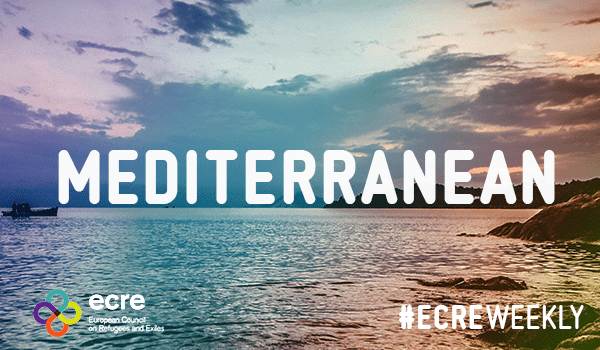Within just a few days 189 lives have been saved by the civilian search and rescue fleet on the Mediterranean. As the number of interceptions and returns to Libya approaches 25,000 in 2021, the International Organization for Migration (IOM) expresses concern for the people returned, often unaccounted for in the country notorious for widespread abuse and violence against people on the move. Italian Interior Minister Luciana Lamorgese urges for EU solidarity and relocations as arrivals increase.
A hectic period on the Mediterranean has continued for the civilian search and rescue fleet. Between 18 and 20 September, rescue operations carried out by Ocean Viking (operated by SOS Méditerranée), the Nadir (operated by ResQ Ship), and Geo Barents (operated by Médecins Sans Frontières (MSF)) saved 189 lives on the Mediterranean. These included the rescue of 25 people, including three children, on 18 September by the Ocean Viking off the coast of Libya. The boat rescued another 33 people the following day, also in Libyan waters. The two operations were supported by NGO reconnaissance planes Seabird and Colibri2, operated by Sea-Watch and Pilot Volontaires. Later the same day the Nadir rescued 58 people in the Maltese SAR zone. As the sailing boat lacked capacity for the sizable group, and Maltese authorities denied taking responsibility, the people then boarded the Ocean Viking. In the last of four consecutive rescue operations, the Ocean Viking saved 13 people adrift on a wooden boat in Maltese waters.
With 129 people onboard, including at least one pregnant women and several children, the youngest just 30 days old, the Ocean Viking waited several days to be assigned a European port. During this time several people with health conditions were disembarked, before SOS Méditerranée confirmed on 23 September that the remaining 122 people onboard would be disembarked in Sicily. The Geo Barents vessel picked up 60 people in two separate operations on 20 September. Six people were rescued from a small fibreglass boat off Libya, and another 54 people, including 21 children and one baby, were rescued later in the day. Reportedly, survivors cried out “our sufferings in Libya are over” as rescuers approached.
Despite the evident need for rescue capacity – with national maritime authorities often unresponsive or late – the crackdown on the civil fleet is ongoing. On 22 September, Sea-Watch International’s vessel Sea-Watch 4 set sail again after spending five months impounded in Trapani. The NGO said on Twitter: “It is not often that our 2 ships are free at the same time. Like other civil rescue ships, they are often blocked by Italian authorities with flimsy bureaucratic justifications such as that we have too many life jackets on board”. Another NGO, Seebrücke, recently organised a human chain to demand EU action to end the loss of life on the Mediterranean. The action, which involved 271 organisations from Germany, Austria, and Italy, connected people from the North Sea to Italy. 1,392 people on the move have lost their lives in the Mediterranean region in 2021 so far, 1,114 of whom are confirmed dead or missing on the central Mediterranean route.
Between 12-18 September, 819 people were intercepted and returned to Libya bringing the total in 2021 to 24,420. IOM express concern over: “the disappearance of thousands of Europe-bound immigrants who were intercepted and returned to Libya, fearing that many of them could have ended up in the hands of criminal groups and traffickers, while others were being extorted for release”. 6,000 of the people returned are detained under extremely harsh conditions in official detention centres, while more than 18,000 others remain unaccounted for.
Meanwhile, arrivals to Italy continue. The NGO hotline Alarm Phone reported on 16 September that it had “strong reasons to assume” that 45 people adrift in the Maltese SAR zone had been rescued by the Italian coast guard and taken to Lampedusa. Media reported on 17 September three disembarkations of 108 people to Lampedusa bringing the total number of people in the hotspot to 880. On 22 September Alarm Phone confirmed that 55 people adrift with a broken engine in the Ionian Sea were brought to Italy. Other landings of 121 people included 28 children in Pozzallo and 54 people that arrived in Roccella Jonica, a place that has seen 26 landings over a three month period. During a meeting in Rome with European Commission Vice President Margaritis Schinas on 20 September, Italian Interior Minister Luciana Lamorgese stated that: “Italy, faced with growing flows by sea connected to situations of grave political and economic crisis affecting countries like Tunisia and Libya, is waiting over the coming months from member States for a concrete sign of solidarity regarding the reallocation of migrants”.
For further information:
- ECRE, Med: More than 23,000 People Returned to Unsafe Libya This Year, Arrivals to Italy on the Rise, Over 1,000 Lives Lost at Sea, Rescues in the Alboran and Western Med, September 2021
- ECRE, Med: More Than 500 People Rescued Off Lampedusa, Arrivals Up in Italy as Malta Sees Decrease, 23,400 Lives Lost on Main Migratory Routes Since 2014, September 2021
Photo: ECRE
This article appeared in the ECRE Weekly Bulletin. You can subscribe to the Weekly Bulletin here.

